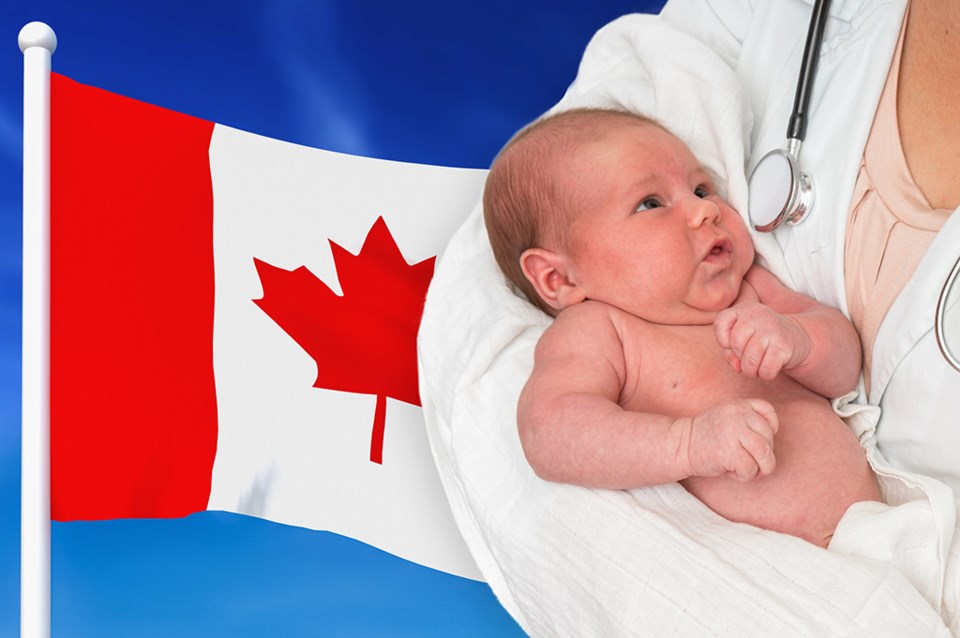NEW CANADIAN MEDIA — Although birth tourism in Canadian hospitals represents less than one percent of babies born in this country, one Calgary doctor wants to discourage the practice, saying the births are becoming an added weight to an already overwhelmed Canadian healthcare system.
“Birth tourists being specifically people who are coming in specifically to have a birth then go back to their original country,” said Colin Birch, a Calgary obstetrician gynecologist.
They probably come to give birth for the advantage of birthright citizenship for future gains whether it be for themselves or their family, said Birch. “There are still immense advantages of living in a place like Canada,” he said.
“Is it a big problem? Well if you look at the numbers, absolutely not. It’s small.”
“Is it big enough to be a problem? I actually think it is,” he said.
Reason being Canada is in a healthcare crunch, “every bed is sacred,” said Birch.
As a healthcare system we are suffering from a capacity point of view and the expectation is to do more with less, he said.
“Canada is not really set up because of its socialized healthcare system for private pay patients and the demands that come with private pay patients,” said Birch.
The expectations from paying patients to patients covered by provincial health care are different.
“Not saying their care is different. Care is care,” he said.
Health care is expensive and when it comes to neonatal care it is astronomical if a baby needs to be in the ICU, he said.
The unpaid bills of the hospitals are massive, he said.
Calgary has taken a different approach to hospital bills associated with birth tourism. Birch confirmed the Calgary system requires a $15,000 deposit.
“It’s a very honest and upfront system,” said Birch. “It doesn’t pay the hospital fees no. It’s a deposit which pays basically physician fees.”
From the deposit what doesn’t get spent goes back to the patient, he said.
“We wanted to discourage the practice because it was becoming a bigger burden in Calgary,” said Birch. “The potential problem with that is the patients will then start moving to practitioners who are outside the city limits.”
It isn’t a perfect process but it’s an attempt to implement some sort of order, he said.
Prior to the deposit process birth tourism had impacts on the capacity of the hospital and ability at times to care for Canadian patients, he said.
Canada and the U.S. are the only countries in the G7 to offer birthright citizenship according to canadianimmigrationexperts.ca.
“What we need to debunk is the idea that all people who are not insured are not necessarily birth tourists,” said Birch.
“There’s a large undocumented population in the country,” he said. They are contributing members of society but are not documented, Birch said.
He wanted to make it clear undocumented folks who are uninsured are not birth tourists.
Birth tourism is not just a medical issue but a social issue that should be addressed, he said.
In the fiscal year of 2021 to 2022 Guelph General Hospital had a total of 1,707 deliveries, 11 were people from out of country. This breaks down to 0.6 per cent of deliveries were out of country.
Between April 2022 to February 2023 there were 1,543 deliveries and 18 were people from out of country who gave birth at the GGH. This is 1.2 per cent of the deliveries were out of country.
At the other end of Canada in Vancouver much of the same occurred at Richmond Hospital, in 2022 there were 22 nonresident deliveries. This number accounts for 1.5 per cent of the total deliveries at the hospital.
“All maternity patients coming to Richmond get the care they require to deliver their child safely. Care is always triaged according to the safety of the mother and baby – it is never delayed based on residency,” stated in an email from Vancouver Coastal Health (VCH).
VCH also said it does not support marketing of maternity tourism. Births from nonresidents have not led to disruptions of maternity services, said in the email.
“VCH will never deny urgent and emergent care based on ability to pay or where a patient is from, but we do expect to be compensated as we are accountable to B.C. residents for hospital and health care services. We are committed to collecting compensation from non-residents who use our medical services,” said in the email.
– With files from Alec Regino.
Santana Bellantoni is a graduate of Carleton University’s journalism program. She was born and raised in Canada’s capital, Ottawa. As a general assignment reporter for GuelphToday she is looking to discover the communities, citizens and quirks that make Guelph a vibrant city.
This story was written in partnership with Village Media as part of New Canadian Media’s microcredential on inclusive journalism.




